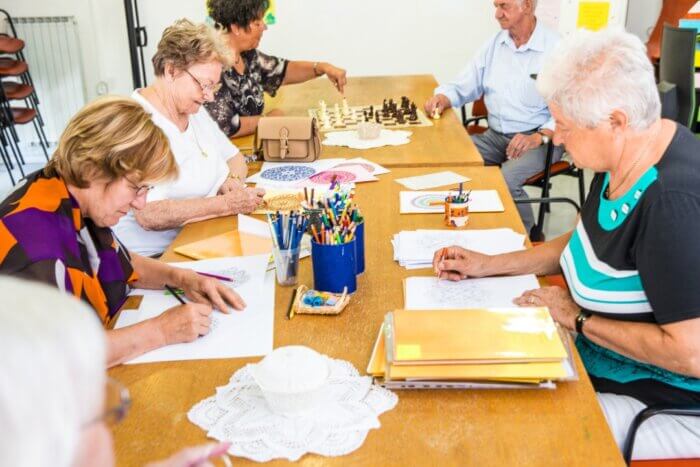How Assisted Living Changes Senior Mental Health

Senior mental health is a serious concern for anyone over age 65 and their loved ones. An estimated 20% of adults over age 55 experience some kind of mental health concern. Cognitive impairment, bipolar disorder, depression, and anxiety are some of the most common conditions reported in older age groups.
Mental health has a direct impact on overall wellness. Symptoms can be physical in nature, like the pain associated with depression. Suicide is also a very real concern. The suicide rate in men age 85 and older is 45.23 per 100,000. That is a significant increase compared to the overall suicide rate, which comes to 11.01 per 100,000 for all age groups.
Many things in life change as we grow older. For some people, this can mean facing new challenges and hardships. The situation can be even harder for older adults who do not have a support network of friends, family, and caregivers to help.
Some of the most common life changes that can lead to mental health problems in seniors include:
- Chronic medical conditions
- Death of friends and family
- Living in isolation
- Decreased mobility
- Lack of exercise
- Insomnia and sleep problems
If you are looking into enhancing quality of life for your senior loved one, make sure you take their mental health into consideration. Sometimes that can mean making bigger changes like a move into assisted living.
Assisted Living Provides Support for Senior Mental Health
As soon as an elderly person moves into an assisted living community, many of the risk factors for mental health conditions become more manageable. These facilities are built to provide optimum safety and care and ease the burden that seniors face when living on their own.
The staff handles all the daily chores and basic care needs. Residents no longer worry about cooking, cleaning, or home maintenance. This lowers stress and reduces the risk of stress-related conditions.
Assisted living homes are also designed for safety and security. Seniors are considered a vulnerable population when it comes to crime and fraud. Moving into a retirement community can provide a safe place for aging people. Most senior living facilities include locked doors and windows with a check-in desk that monitors visitor access.
There’s always staff around to help monitor and provide support. This can bring peace of mind to residents and their loved ones.
MD Senior Living communities offer a balance of independence and care. Our facilities are managed by a group of doctors who understand the needs of seniors. Our team provides support every day and can watch for changes in mental health status.
If we notice signs of an issue, we will alert the resident and loved ones who oversee their care to ensure that they get the attention they need without delay. Identifying problems sooner means a better chance at effective treatment and management of mental health conditions.
Assisted Living Prevents Social Isolation in Seniors
Social isolation in seniors is an issue that can be easily missed. When an older person lives alone, their social circle may begin to shrink. This occurs as friends and family move or pass away over the years.
Health conditions can make it difficult to go out and be around others. Mobility limitations create obstacles to getting exercise and doing the things we used to do. It can mean no longer visiting friends, going shopping, or doing things that help us connect with other people.
A senior may find themselves stuck at home most or all of the time with little access to the rest of their local community.
Asking for assistance can be difficult. Many older generations don’t want to seek help. They worry about becoming a burden on their loved ones or losing their freedom. A common concern among seniors when it comes to assisted living is privacy. They fear that moving into a senior living home could rob them of their autonomy, dignity, and independence.
This is not true. Today’s assisted living communities are lively, upbeat places that let seniors live on their own terms. Communal spaces are provided to make it easy to socialize and meet new people. However, seniors can still retreat to their private rooms whenever they want to do so.
These places have staff on hand to help with mobility, so a senior who cannot move on their own can still visit areas where their peers gather. They can still be a part of events and activities, just like when they were younger.
Most assisted living communities have packed events calendars, with something going on almost daily. These events and gatherings are available on-site, so everyone can participate.
Quality of Life and Senior Mental Health
A person’s quality of life involves more than their physical status. Our mental health affects how we feel, think, and behave. It colors our perception of the world around us. Someone with a severe untreated mental illness will suffer from a lower quality of life compared to someone who has a healthy outlook.
That’s why it’s so important for seniors to manage both physical and mental health. No one should have to suffer alone with depression, anxiety, or other conditions.
Moving into assisted living is a good first step in managing both. A senior community will help reduce stress, prevent social isolation, and create a support network to monitor wellness. Seniors should still seek the services of qualified mental health professionals as needed.
Doing both helps many seniors gain better control over their wellbeing so that they can enjoy the highest quality of life possible.






Leave a Comment